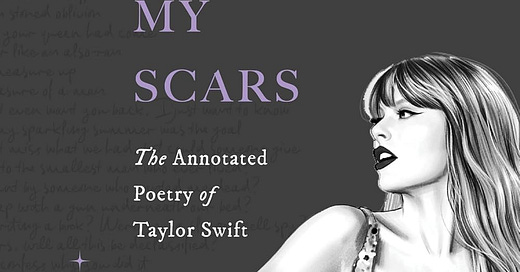One single thread of gold tied me to you
New episode, Show & Tell on ❤️ Romantic Love ❤️ out now!
“One single thread of gold tied me to you.” This week on AP Taylor Swift, we are kicking off Valentine’s season with a show-and-tell on Romantic Love. ❤️ We explore how Taylor writes about romantic love, from the grand, sweeping gestures to the small, intimate moments that define a true connection. We break down three iconic songs—“You Are in Love,” “Lover,” and “Invisible String—" examining how each song captures different facets of romantic relationships.
This week’s episode is sponsored by the new book “Stars Around My Scars: The Annotated Poetry of Taylor Swift” written by Dr. Elly McCausland, out now wherever books are sold.
🎧 Listen above and ⬇️ scroll below to read an excerpt from “Stars Around My Scars”
🎥 Sneak Peek
Catch excerpts from the podcast and behind-the-scenes content on YouTube, TikTok, and Instagram
🛍️ Sponsored Content: Get Stars Around My Scars out now!
Grab your highlighters and get ready to dive into the world of Taylor Swift with Dr. Elly McCausland’s Stars Around My Scars. This isn’t just any book—it’s a treasure trove for all Swifties, offering a deep dive into 46 of Taylor’s most beloved songs. Dr. McCausland breaks down the lyrics line by line, uncovering hidden gems and literary references that make Taylor’s songwriting so special. This book will help you see her work in a whole new light. It’s like having a personal guide to the poetic genius of one of our generation’s greatest artists!
Get your copy of Stars Around My Scars here.
📘 This week’s extra credit - Brought to you by Stars Around My Scars by Dr. Elly McCausland
This week we are thrilled to share an excerpt from the book Stars Around My Scars by Dr. Elly McCausland! Get your copy of Stars Around My Scars here.
For each song covered in Stars Around My Scars, Dr. McCausland provides her annotations as well as an analysis of the song.
The Prophecy - Analysis
Drawing on imagery from mythology and fairy tale, Swift here explores the idea of one's fate and destiny seeming "sealed" and unchangeable. The song reads as semi-auto-biographical, exploring the pressures of fame and success, particularly as they impact one's romantic life and desire to find authentic love and a soulmate. Swift uses several images and metaphors from elsewhere in her discography, but shifts them subtly in ways that poignantly emphasize a feeling of exhaustion, uselessness, anxiety, and frustration. "The Prophecy" might be read as a sister song to"Cassandra," which immediately follows it on The Tortured Poets Department. Cassandra is a figure from Greek mythology, a Trojan princess cursed always to utter true prophecies but have no one believe her. "The Prophecy" seems to explore the other side of the coin: a woman who refuses to believe the truth of the prophecies uttered to her. Both songs invoke women from ancient literature and legend (Cassandra and Eve) to explore female frustration, the social burdens and expectations placed on women, and the idea of a fundamental, objective truth that we might long to manipulate, but cannot. The voice is often tragically naive, implying a childish desire to simply find the person in charge and ask them to change the future.
In addition to its rich imagery which corresponds perhaps most closely with that in Swift's song "willow"-"The Prophecy" plays with assonance and rhyme in ways that create a tight correspondence between lines and words, reflecting the "fixedness" of one's fate being sealed and inexorable. There is a slow, lumbering quality between the double rhyme of "quicksand" and "pricked hand," mirroring the physicality of the quicksand as much as the "sinking" realization that the speaker cannot escape her fate. We also find subtle allusions to a long literary history of women "frozen" or fixed in time, including Charles Dickens's Miss Havisham of Great Expectations, whose ghost also haunts Swift's "right where you left me" off of evermore.






